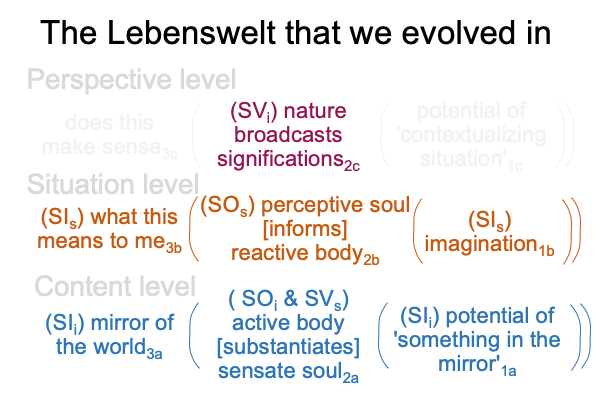0211 At this juncture, I find it necessary to emphasize the novelty of my non-theological assessment. I follow Houck in using concepts and terminology of Aquinas’s theology of original justice and original sin. At the same time, I hold the hypothesis of the first singularity, corresponding to the historical event that the fairy tales about Adam and Eve picture and point to.
0212 Small details loom large.
Why does the Genesis Story of the Fall feature a talking serpent, who ends up crawling on its belly like a snake?
Well, such a creature cannot possibly engage in hand talk. It must talk in speech alone.
Why is there a the tree of life in the Garden of Eden along with the tree of the knowledge of good and evil?
Well, the tree of life represents original justice2c.
0213 Aquinas’s formulations are welcome because we currently have few cognitive tools for articulating the characteristics of our current Lebenswelt and the Lebenswelt that we evolved in.
On top of that, the philosophy of Charles Peirce, the ground for the category-based nested form and the triadic structure of judgment, may be construed as a historical re-emergence of the Baroque scholastic tradition. Peirce’s writings are sort of like an academic re-enactment of the movie Jurassic Park. Modern Positivists think that scholasticism is extinct and then, in Peirce’s seminal act, it hatches from an apparently infertile egg. And, it has teeth.
American philosopher, Charles Peirce (1839-1914), and Baroque scholastic, John Poinsot (1589-1644), arrive at the same definition of sign.
Now, the theology of Aquinas provides unanticipated insights into the consequences of the first singularity.
How much longer will modernism, and faux postmodernism, find safety in the hotel?
0214 This brings me to infant baptism, a source of theological controversy and perhaps, a source of further insight about our current Lebenswelt.
According to Houck, Aquinas offers an account of original guilt. An infant should be heir to original justice2c. But, “he” is not. So, a privation (or evil) accrues just by entering into the world.
Here is the world that each infant innately expects to encounter.

0215 An infant should inherit the Lebenswelt that we evolved in. This is our originating niche. But, the babe is born into our current Lebenswelt. So, the infant is accused from the very start, charged with the crime of a change in Lebenswelt. The child must suffer the penalty.
The transition from the Lebenswelt that we evolved in to our current Lebenswelt is called, “the first singularity”.
The Ubaid of southern Mesopotamia is the scene of the crime.
0216 Saint Paul, while trying to explain the implications of the life, death and resurrection of Christ, stumbles upon this um… revelation. Christ redeems what Adam binds. Adam digs a privation and Christ fills the hole with abundance, so to speak. This implies that the Christian believer attains a good that is even better than original justice2c.
0217 However, this implication hides in the background of controversies about infant baptism in the early Church.
Certainly, when an infant dies, the loss cannot be put into spoken words. Plus, this loss becomes entangled in procedural issues. Is the deceased infant heir to the good that is even better than original justice2c? Two issues are entangled. Both concern the infant’s human subjectivity. The infant as subject enters into a fallen world. What are the mechanics connecting the Fall to the subject? What are the conditions in which these mechanics operate?
0218 The early Church Fathers focus on conditions. Adam, the first man, and Eve, the first woman, eat from the tree of the knowledge of good and evil. Thus, the human condition changes soon after Adam and Eve are fashioned from dust and rib, respectively.
0219 Saint Augustine of Hippo offers a mechanism. Since Adam and Eve are the first man and first woman, they are the ancestors of all humans. So, the mechanics must have something to do with reproduction.
Well, Augustine certainly comes up with ‘something’ implicated in procreation. Indeed, ‘something’ is a little embarrassing to talk about.
0220 Why?
No one wants to talk about desire.
